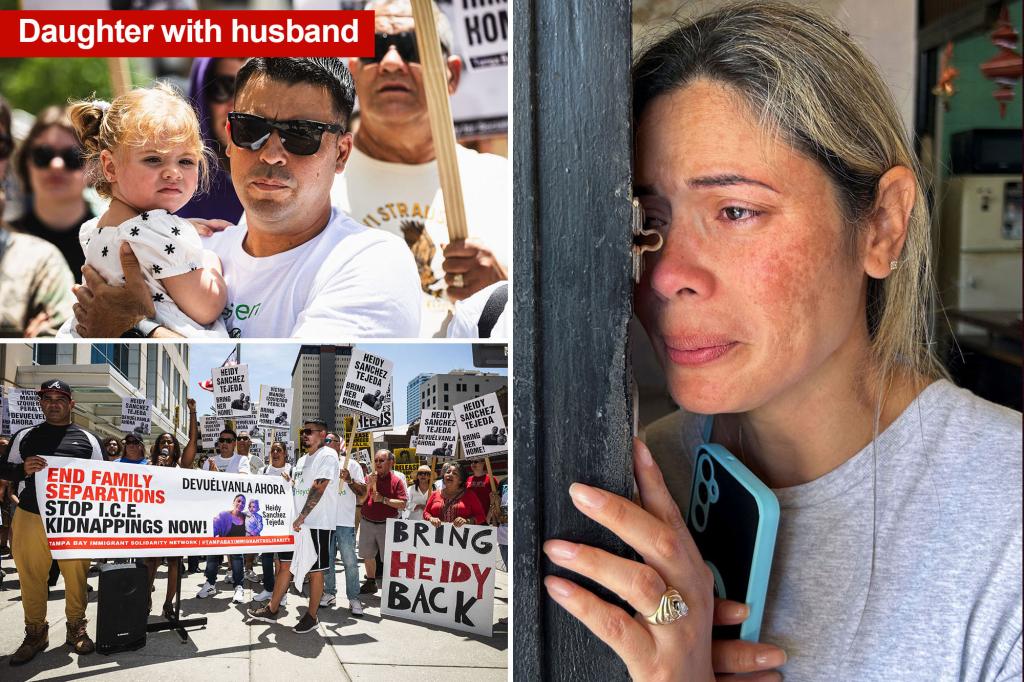HAVANA, April 29 – Cuban mother Heidy Sanchez collapsed into tears as she recalled the moment last week when U.S. immigration officials in Florida told her she would be deported and separated from her still-breastfeeding 1-year-old daughter.
“They told me to call my husband, that our daughter had to stay and that I would go,” she told Reuters in an interview at a family member’s home near the Cuban capital, Havana. “My daughter got nervous and agitated and began to ask for milk, but it didn’t matter to them.”
The U.S. Department of Homeland Security told Reuters that Sanchez’ statement was inaccurate and contradicted standard Immigration and Customs Enforcement protocol.
“Parents are asked if they want to be removed with their children or ICE will place the children with someone the parent designates,” Assistant Secretary Tricia McLaughlin said in an emailed response late on Monday.
“In this case, the parent stated they wanted to be removed without the child and left the child in the care of a safe relative in the United States.”
DHS did not immediately respond to a Reuters request for evidence that Sanchez had been offered the choice to take her child with her to Cuba.
Sanchez said she arrived in her home country hours after being detained, with no passport or identification and no documentation from the United States explaining the reason for her deportation.
The contradictions in Sanchez’ case highlight concerns among civil rights advocates over the due process rights of immigrants during U.S. President Donald Trump’s immigration crackdown, a key platform of his 2024 election campaign.
Trump’s administration on Monday touted the early results of the aggressive enforcement measures, highlighting a drop in illegal border crossings.
Democrats and civil rights advocates, however, have criticized his administration’s tactics, including the cases of several U.S.-citizen children recently deported with their parents. One of the children had a rare form of cancer, according to the American Civil Liberties Union.
Unlike those cases, Sanchez, who was surprised at a routine check-in at an ICE office in Tampa last Thursday, said she was given no choice but to leave behind her daughter, a U.S. citizen.
She said officials separated her from her child, escorted her to a van, handcuffed her and later that day, deported her by air to Cuba alongside 81 others.
Sanchez, 44, had been under deportation orders since 2019 but was allowed to temporarily live and work in the United States as long as she regularly checked in with ICE.
During that time, she married a Cuban-born naturalized U.S. citizen and had her first child in November of 2023.
Her husband sought legal residence in the U.S. for Sanchez two years ago as a result of their marriage, but had yet to receive a response, she said.
Sanchez broke down several times during the interview with Reuters. She said she understood that ICE officials were “just doing their job” but said separating a mother from her breastfeeding infant was “unjust.”
“I can’t sleep, I can’t rest,” she said. “All I ask is that they reunite me again with my daughter.”
The case underscores a sharp break in policy between the Trump and Biden administrations.
Under Biden, ICE officials were instructed to consider the impact of enforcement action on families.
Trump rescinded that guidance, which had prioritized the deportations of serious criminals. Instead, Trump broadened the scope of enforcement, including targeting migrants like Sanchez with standing deportation orders.
Sanchez, who said she had no criminal record, is now just a few hundred miles from her daughter in Florida but a world apart.
Worsening shortages of food, fuel and medicine on the communist-run island, just 90 miles (145 km) off Key West, have made life unbearable for many Cubans.
The crisis has spurred a record-breaking exodus from the island of over 1 million people, or upwards of 10% off the population, a predicament Cuba blames on U.S. sanctions that contribute to strangling an already inefficient state-run economy.
Sanchez said she now faced the “impossible” decision to remain apart from her infant daughter or bringing her to crisis-racked Cuba.
“Everybody knows the situation here,” she said.
Read the full article here

